Photo-essay on migrant rights in times of emergency. Migrant workers in Malaysia during COVID-19
On 16 March 2020, the Malaysian Prime Minister Muhyiddin Yassin announced a Movement Control Order, locally known as an MCO, during a live television broadcast. 1 Authorised under the 1988 Prevention and Control of Infectious Diseases Act and the 1967 Police Act, the MCO sets out a wide-range of measures to try to stem the spread of COVID-19. The order banned movement nationwide and mass gatherings, including all religious, sports, social and cultural activities. Friday prayers for the country’s estimated 20 million Muslims also featured on this list of restricted activities. Initially planned for two weeks, the MCO was extended and modified several times, eventually easing movement restrictions in June 2020.
Under the MCO, establishments supplying basic living needs or public amenities such as transport, water and electricity, were allowed to stay open. Banks, supermarkets, grocery stores and other small food stores remained operational. So too did hospitals and companies providing essential services or products, such as medical equipment. Schools and universities, public or private, were closed. Malaysians were no longer able to leave the country, and those who returned from abroad had to self-quarantine for 14 days after undergoing a health screening. Due to the rising number of COVID-19 cases, the government imposed mandatory quarantine at government-designated hotels for incoming travellers. Restrictions were placed on the entry of foreign nationals into the country. Like the experiences of so many elsewhere in the world, daily life came to a standstill, with great uncertainty about when and how lockdown would be lifted and about what would come after.
Malaysia has a population of about 32 million. There are around 2 million documented migrant workers, with an estimated 2 to 4 million additional undocumented migrants in the country, according to the International Organization for Migration. 2 Malaysia’s migrant workers come mainly from Indonesia, Nepal, Bangladesh, India, Philippines, Myanmar, Thailand, Laos, Cambodia, Vietnam, Pakistan and Sri Lanka.
This essay and accompanying photos explore the COVID-19 lockdown experience from the perspective of the migrant workers and the frontline workers who have long advocated for migrant workers’ rights and protection. Whilst the photos are unique to Kuala Lumpur, the common theme of a vulnerable group, long acquainted with hardships, being pushed even more towards the thin margins during a time of emergency and stigmatisation, is not unique to Malaysia. No matter where we are in the world, we will recognise shades of these common experiences in our own communities, of those already struggling, looking for food for their families and worrying about their livelihoods with an uncertain future.
Below is a summary of email conversations between Sumitha Shaanthinni Kishna (Director of Our Journey) and Bonny Ling, during April-May 2020, accompanied by photos taken by the volunteers and partners of Our Journey, and selected by Ewa Dąbrowska. Together, they give insight into the extraordinary challenge of protecting the migrant population during a global crisis.
LING: What was the MCO (Movement Control Order) like in Malaysia, when it came in on 18 March 2020? Were people prepared for it? It was around then that lockdown became the norm for so many others in the world as well.
KISHNA: It has been crazy here. We're on a semi-lockdown and this has left thousands of migrant workers without access to food, especially those who are daily wage earners. This includes very strict movement, as well as an 8 AM to 8 PM curfew within a 10 km radius from their homes. The Government of Malaysia announced food packages but limited only to Malaysian nationals. Can you imagine that? So this has been a disaster for the migrant, refugee community, the stateless and undocumented. Many were left without their daily wages. This means many are without food. The migrant community had reached out to us for food and we had to do something.
LING: Can you describe how your organisation Our Journey came to the idea of providing food aid for the migrant community? Have you done anything similar in the past?
KISHNA: In all honesty, I didn’t think food was an issue. How wrong I was. An Indonesian community leader had reached out to me asking for cash to buy food for the community, so I called up some mosques and Members of Parliament for help, but they all said their aid was for Malaysians. So I put up a plea in WhatsApp groups and sent it to my closest friends…they have been amazing and the donations have been coming in to help the migrant community. That was when we started coordinating teams to take calls, and teams to source for provisions at different places (as there are restrictions on bulk buying) and distributing…I was able to bring in the Bar Council Migrants, Refugees and Immigration Affairs Committee as a partner, so that if any legal issues cropped up they can help. Thankfully so far we did not face any legal hurdles.
LING: Can you describe how you go about delivering food aid to the migrant community on a daily basis?
KISHNA: An informal charity group of friends called WeLoveWeCareWeShare was the first group that helped me in my venture. We coordinated a team of friends and migrant community leaders and we have been raising funds and distributing provisions daily since 26 March 2020. We obtained the necessary permission from the government to move around to distribute the aid. So here we are having to feed the needy migrants. We have given provisions to over 7000 migrants and many 1000s more are on my list. It has been a monumental task to coordinate the migrant community leaders and friends to get the names, addresses and contact details of those who have been reaching out, raising the funds and then sourcing the provisions in bulk and lastly distributing. This is what I am currently doing day and night! I have an amazing team that has taken no pay and spent their own money traveling every day to distribute food aid.
LING: There is a sharp disconnect between the rhetoric of ‘One World’ when we talk about the vast percentage of the world’s population experiencing the uncertainty and the mental stresses of a lockdown versus the responses of governments worldwide being very much divided on the lines of citizenship and nationality. As countries closed their borders, the stigma was on anyone who was not a national, seen as virus vectors and a threat. How are the foreign workers you have met feeling and coping during the MCO? Are their own embassies providing some assistance?
KISHNA: People are literally starving here. Some employers [are] abandoning their workers. Some [workers are] not given food, many not given salaries to buy their food. Some asked to buy their own. The ugly side of some humans. The embassies are doing their part, but they also lack resources and manpower. There are embassies who had reached out to us to aid their workers, and we have no problem taking on these extra names. We have provided food aid to [nationals from] 10 sending countries. We have yet to provide for Sri Lankans and Thais, as no needy migrants from these countries have reached out to us yet. The migrant communities have been amazing as well in assisting us. We have PERTIMIG (Indonesia), AMMPO (Philippines), Bhalobashi Bangladesh, and PNCC (Nepal), who have been on the ground speaking to the migrants and collating the names.
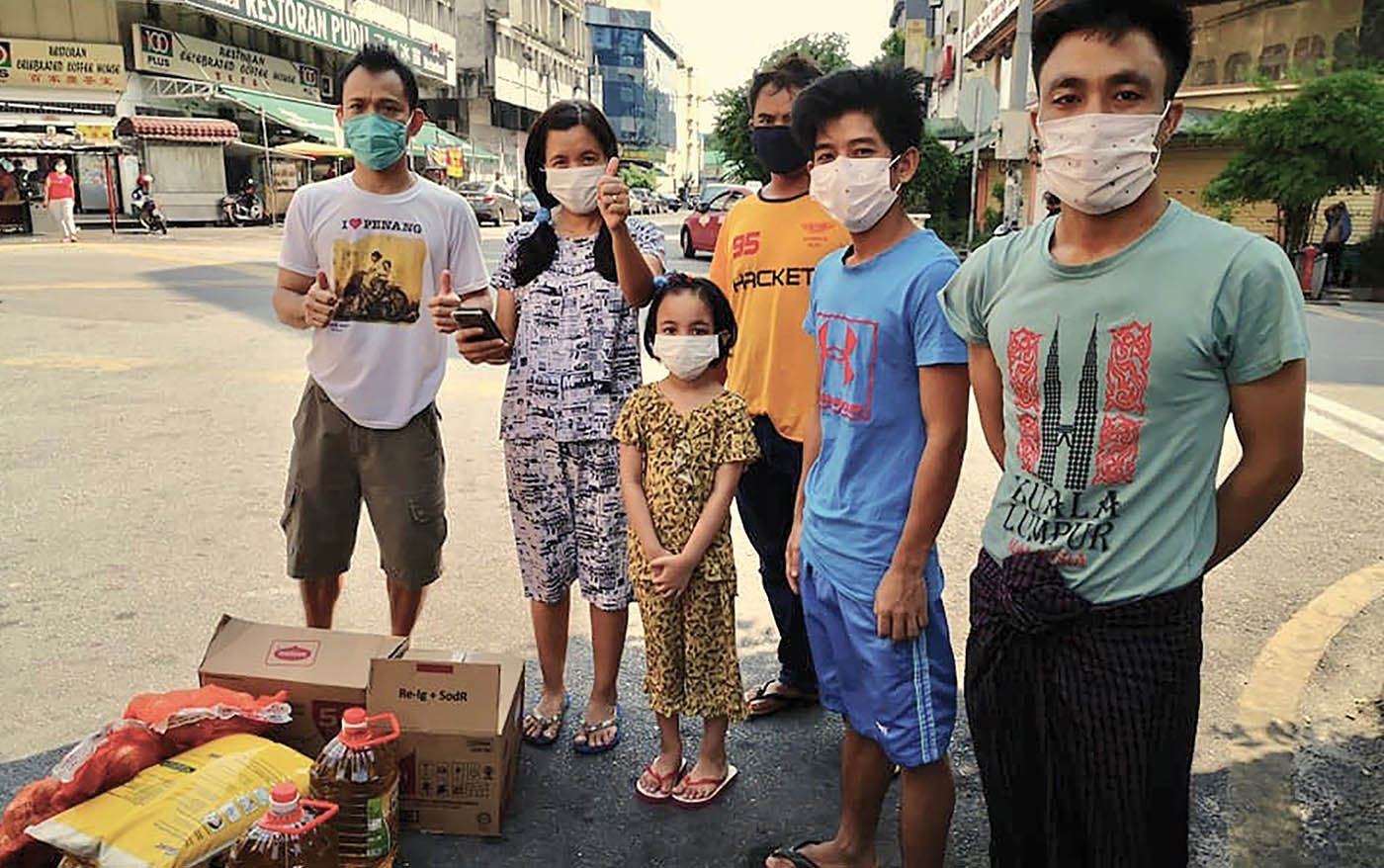
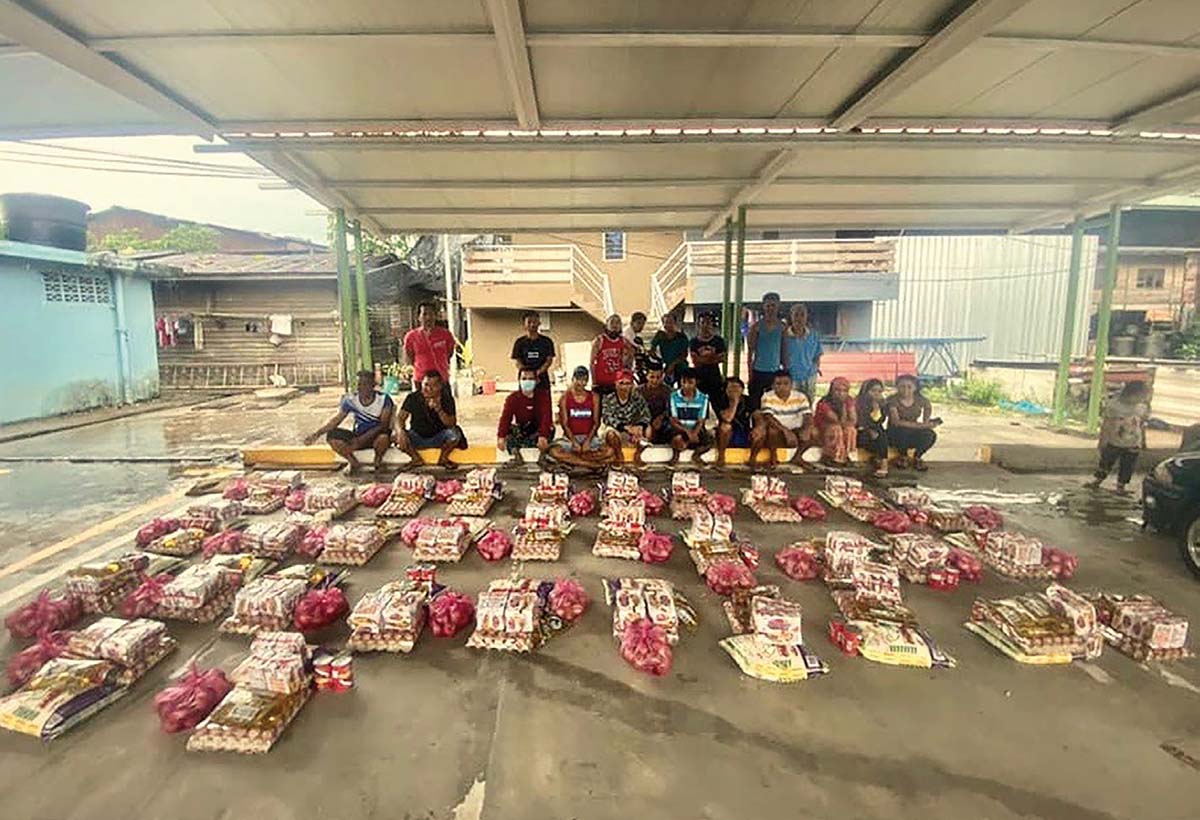
Apart from migrants in Kuala Lumpur and Selangor who were our primary recipients, we also provided food aid to migrants in Penang, Perak Melaka, Pahang, Sabah and Sarawak.
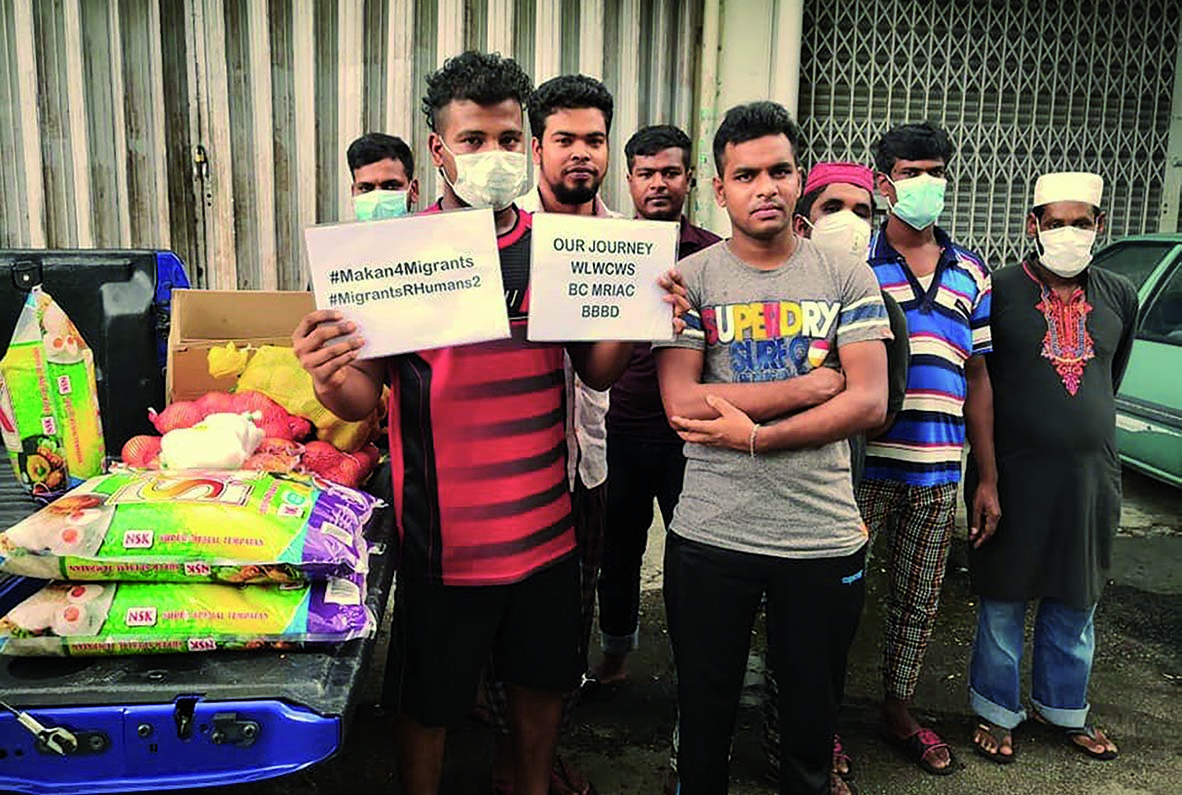
LING: Are the migrant workers being fired from their jobs or kept in a perpetual holding position of great uncertainty, and without pay for the foreseeable future?
KISHNA: I am actually appalled that some companies have been withholding salaries since February, which has left the migrants unable to pay for food and their rent (another bigger headache we had to eventually tackle). While I understand that the employers are being hit hard, the government has announced plenty of economic stimulus packages even as far as deferring car loans, business loans, housing loans and personal loans for 6 months, including giving companies soft loans at very minimal interest to recover after this crisis is over. If they look after their workers in times like this, the workers will continue to work for them and help build their companies. What are these companies without the workers? You need a healthy workforce to come back to work at your companies. I cannot fathom how these employers never gave a second thought how the workers were coping during the lockdown. Even if they can’t provide the food, the companies could have partnered with us to provide the same.
LING: Is there any example of a responsible company during this time that thought about their foreign workers’ wellbeing? And what would you say was the ingredient that got them to act differently - is it corporate leadership or some external pressure?
KISHNA: One construction company reached out recently and asked if we could provide [meals] for his 30 subcontracted workers. I mentioned that I only spend RM50-60 [for] provisions per head and these provisions last a month for the migrants. So we gave him that details and he has since gone to buy the provisions for his workers. RM50 X 30 workers = 1500 (a one-time cost) for the employer. Well assured his workers are fed and ready to work once the restriction is lifted. It’s really that simple to feed your workforce. More than wanting funds, I want the companies to take responsibility of feeding their workforce.
LING: How did the state overlook its own obligation to protect migrant workers during this time of a health emergency?
KISHNA: The government's stand on not providing for the migrants is disappointing. However, the government has given concessions, such as free COVID-19 screening and free treatment for all migrants regardless of legal status, as well as committed to not arrest the undocumented at the beginning and allow those with expired visas during COVID to renew after the restriction period is over. Of course, if there is no free screening and treatment for all, the containment can’t take place effectively. No detention because of fear that it may spread in the detention centres. However, the government has conducted several raids since 1 May 2020 and detained hundreds of migrants, which resulted in a COVID cluster in the detention centres.
LING: It wasn’t so long ago that we met to talk about combatting human trafficking in East Asia and what lessons countries like Malaysia, with its complicated and mixed migratory situation, can offer as a comparative example. That was from a different age, pre-COVID-19, but the challenge of effective anti-trafficking has not disappeared in the meantime. Where do we start to pick up the thread of the advocacy work from before to hold states accountable to their obligation to prevent, suppress and punish the trafficking in persons?
KISHNA: It’s crucial that we understand the impact of COVID-19 on trafficking issues and address them [from] a human rights perspective. A week after the lockdown in Malaysia, the government reported that crime rate in the country fell by 70%. 3 This is not surprising since the police and army were down on the streets full force and patrolling around for MCO violators. That does not mean that human trafficking activities have ceased. The lockdown shifted the focus of the government and civil society to combat COVID-19. Curfews, movement restrictions and lockdown measures which were seen as effective measures to flatten the COVID-19 curve also impacted on the state’s and civil society's capacities to address the needs of trafficked victims. Government and service providers had to expand their focus to address the needs of many communities and not only the trafficked victims. Shelter providers have had to stop taking in new migrants in need of shelter or impose a mandatory COVID-19 testing, which is costly.
“The migrant communities have been amazing as well in assisting us. We have PERTIMIG (Indonesia), AMMPO (Philippines), Bhalobashi Bangladesh, and PNCC (Nepal), who have been on the ground speaking to the migrants and collating the names.”
Another example is that tighter border controls have not deterred smugglers or traffickers. Under the government's Ops Benteng [a government operation aimed at undocumented migrants under the stated goals of safe-guarding Malaysia from cross-border crimes and preventing the spread of COVID-19], the authorities arrested almost 2000 persons who attempted to enter the Malaysian borders without proper documents. 4 They were stopped and sent back, and many were also arrested as well. The primary focus was not to identify if those entering were smuggled or trafficked victims, but rather as potential COVID-19 carriers.
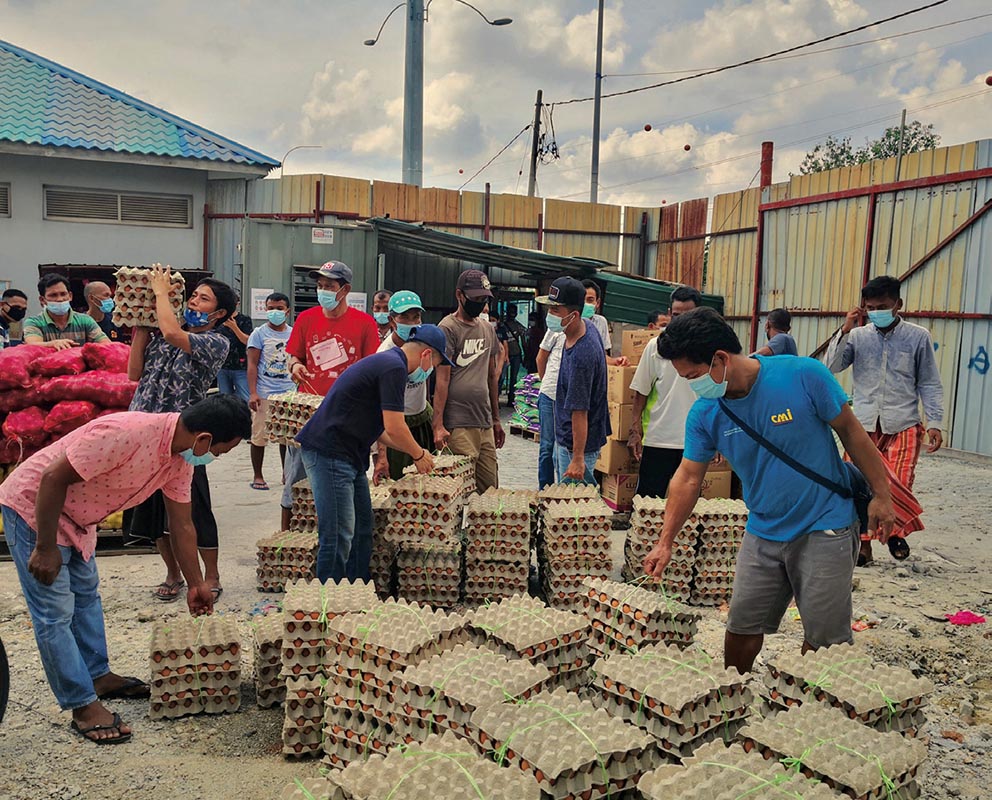
Over 500 migrants collecting their provisions while their families watch from the semi-constructed exclusive condo, where the workers also live and work.
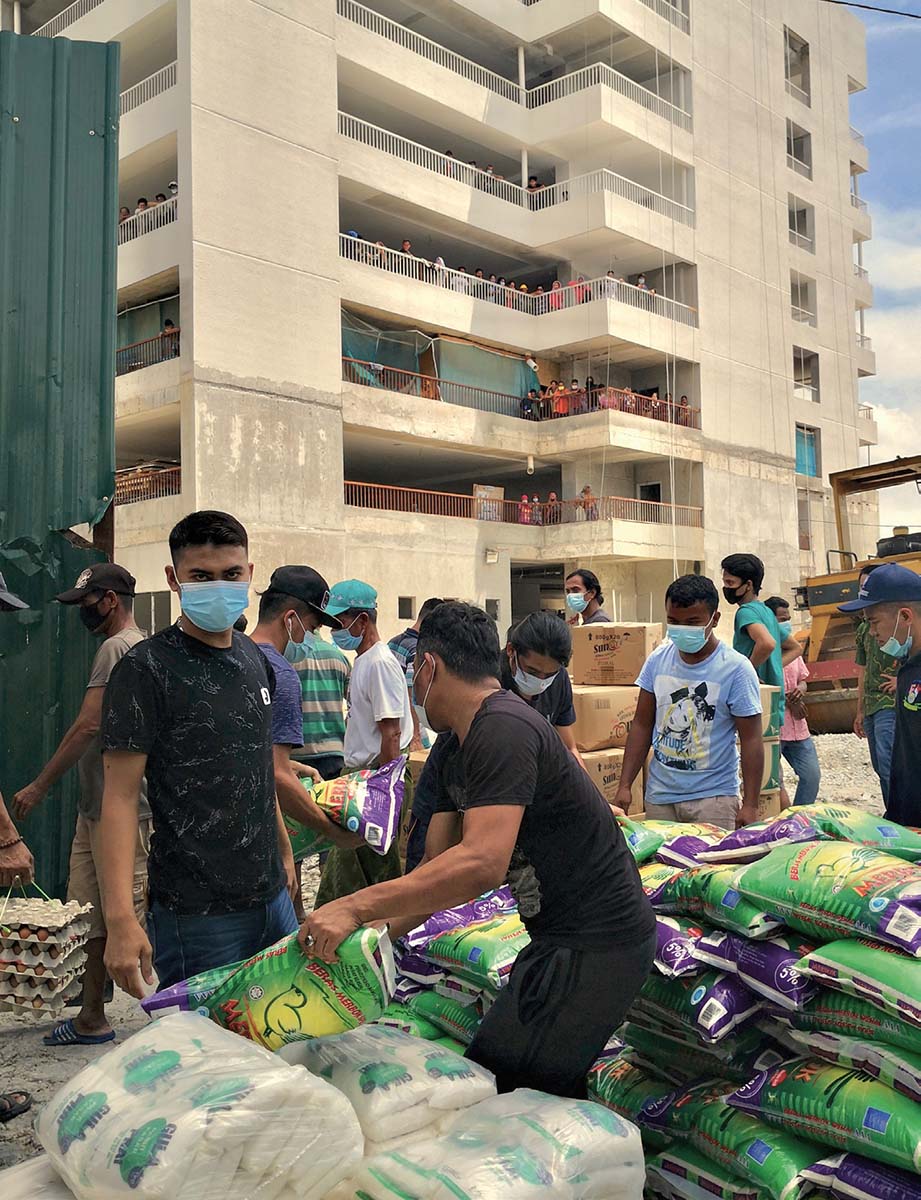
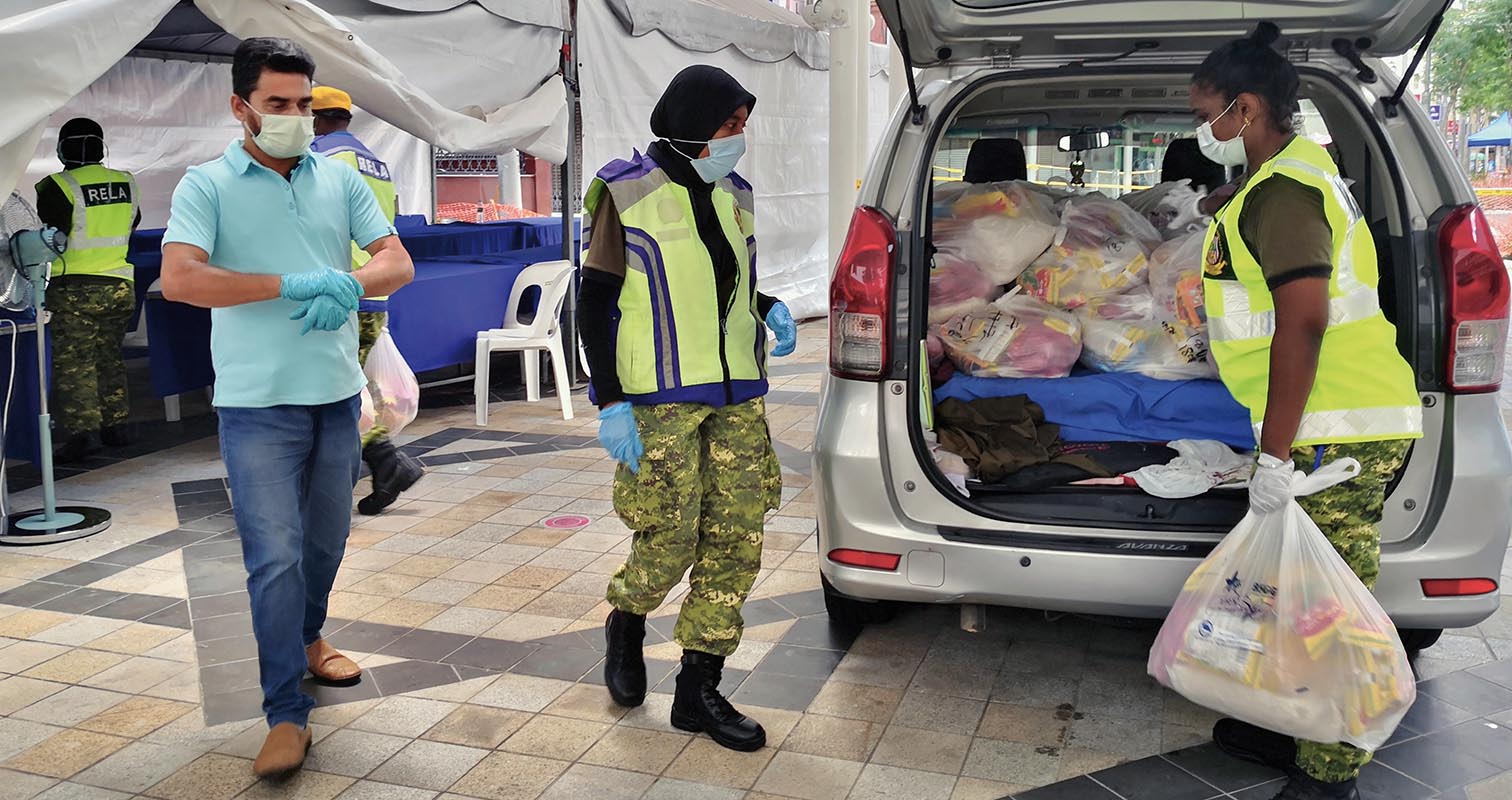
Distribution of food aid through the Welfare Department for Migrants at Selangor Mansion and Malaya Mansion, Masjid India, Kuala Lumpur, which was placed under an Enhanced Movement Control Order (EMCO) from 7 April to 4 May 2020. These locations were raided on 1st May by authorities who arrested scores of undocumented migrants. This was the beginning of several raids that the authorities carried out in EMCO areas.
Further, the lockdown resulted in many daily wage migrants losing their only source of income and post lockdown saw many companies winding up or downsizing, potentially rendering many migrants jobless. In desperation, many migrants are taking on work with wages lower than the minimum wage as a form of survival. Child trafficking may heighten as well. Many community schools are still in shutdown. With poor migrant children dependent upon schools for food and shelter while their parents work, we could potentially see many children on the streets begging for food or being brought to work with parents.
LING: And what about the corporate sector? There is a lot of hope that with the growing recognition of the important roles played by the many low-paid, unskilled workers—for instance, like those in farm work, delivery, supermarkets that kept the food supply chain going during COVID-19—that this will translate into tangible improvements in the situation of migrant workers worldwide. What are your thoughts? Are you hopeful?
KISHNA: I want brands and associations to take note of how their supply chain has been poorly handling the crisis. We have seen this pandemic categorising some sectors as essential sectors, sectors where many migrants work, sectors that the country needed to stay afloat. Migrant workers kept the food sector, cleaning sector and many other essential sectors running. How can we not recognise their contribution to the nation? Unfortunately, when COVID-19 clusters of migrant workers were found in the wet markets, the local councils saw it fit to ban migrants from working in the wet markets. Even documented workers were not allowed to work, which is an affront to their labour rights. Once this is over, we must come together to share what some governments did well and what CSOs and other non-government actors did. Such a wealth of knowledge, to be better prepared next time.
Bonny Ling, independent scholar and consultant legal analyst. Formerly a Program Director of the International Summer School ‘Business and Human Rights: Interdisciplinary Challenges and Opportunities’, and associated lecturer of law at the University of Zurich, Switzerland. Bonny has worked in the United Nations system and in international civil society bonny.i.ling@gmail.com
Sumitha Shaanthinni Kishna, Founder and Director of Our Journey (https://www.facebook.com/ourjourneymy), an NGO platform in Malaysia advocating for the development of a supportive migration system for non-citizens incorporated with international standards and norms. Sumitha is also a practicing lawyer and the sole proprietor of Messrs Chambers of Sumitha. Sumitha has worked on migrant issues since 2008 ssk010@gmail.com
Ewa Dąbrowska is a lawyer interested in photography and a doctoral candidate in human rights at the Polish Academy of Science. Ewa has worked with refugees in Poland and Germany, and is currently an environmental democracy lawyer e.h.dabrowska@gmail.com